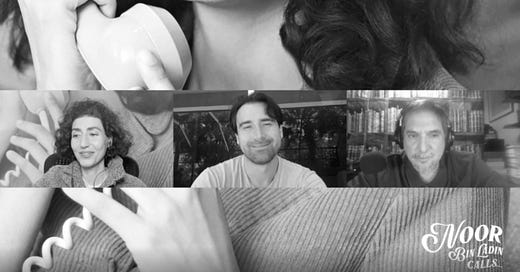Kissinger, Schwab and the British Round Table: a conversation with Richard Poe and Sean Stone.
In this episode of Noor Bin Ladin Calls..., we explore the hidden hand of Britain in the Great Reset.
Last month, Richard Poe and Sean Stone joined me on the podcast to discuss the question of Britain’s “invisible empire”, its web of secretive influence networks spanning the globe.
In his book “New World Order: A Strategy of Imperialism”, Sean uncovers the British origins of globalism. Among other things, Sean's book reveals Henry Kissinger's little-known ties to British intelligence and the British Round Table group, a secret society dedicated to drawing the United States back into the British Empire. Kissinger and his Round Table mentor, William Yandell Elliott, recruited Klaus Schwab and helped him start the World Economic Forum back in 1971.
Sean’s book was brought to my attention thanks to Richard Poe, a dear friend and frequent guest on my podcast discussing British meddling in U.S. affairs. Richard exposed George Soros and his color revolutions in his bestselling book “The Shadow Party” (co-written with David Horowitz). He has also written extensively about Britain’s little known role in inventing and promoting globalism throughout the world. His article, “How the British Invented Globalism” is a must read.
This was a fascinating conversation which I hope we will be able to continue in the future.
Click on image or link: https://rumble.com/v4etm2l-exploring-the-british-question-with-sean-stone-and-richard-poe-noor-bin-lad.html
For a full transcript of this episode, click here.
The Author certifies this article is one hundred percent human made and that no AI was used to produce this article.







Appreciate your reporting and hard work on everything DAVOS and NWO, a subject not getting nearly enough attention and your in depth analysis is putting otherwise uninformed citizens around the world into the conversation of the most important subject on planet earth at this point in time. Everything, literally everything revolves around this subject, economy, foreign policy, war games, mass (intentional) illegal immigration, human and child trafficking, etc!
One war in American history seems to have been forgotten is the war in the Philippines from 1899 to 1902. I am an amateur writer of what I call are family stories. My ancestors were known as the Famine Irish. They came to America from 1844 to the 1850's. I had two great uncles in the Civil War in the 13th Pennsylvania Cavalry from 1862 to 1865 One of their sons was in the Philippines from 1899 to 1902. While doing research for a story of his experience I learned about a special agreement the US came with the British in 1898.
On November 11, 1898, American General Nelson A. Miles declared at a banquet held in his honor in New York that the "war has given us reason and opportunity to appreciate our obligations to the mother country." In response to General Miles's warm tribute, British Captain Alfred Paget replied that "we shall be proud in the future whenever we see the Stars and Stripes on a warship or a merchantman, for we shall know that on board we have, if not a brother, an ally." This friendly exchange epitomizes the sea change that took place in Anglo-American relations during the 1890s. Britain and America, after over a century-long lover's quarrel, began to find common ground during the Spanish-American War. The war removed Cuba from Spanish rule, and won Spanish lands in the Caribbean and the Pacific for the United States. During the war, Great Britain—needing an ally to support its own project of empire building in Asia and Africa—encouraged its Anglo-Saxon cousin to join them in taking up this white man's burden.
I learned that war became the beginning of the United States as a global power. They annexed Hawaii and Pearl Harbor, several ports in the Philippines and Guam. They bought the Philippines for $20 millions dollars and defeated the Filipino Liberation Army and colonized the Philippines, inadvertently defeating a proto-socialsit Masonic army under the leadership of Aguinaldo who had planned on being a dictator.
The US won the war by applying the tactics of total war learned from the Union Army in the Civil War who learned it from the British who practiced that tactic in Ireland in the 18th century. Millions of Filipinos died from the war and disease. The Filipinos suffered greatly in WWII because of their being a colony of the US. If we hadn't been there, the Japanese told the Filipinos if they became Independent they would not attack the Philippines (believe it or not). I doesn't seem likely they would want to colonize a country with 7000 islands. They would have preferred a large land mass like Manchuria. The communist spy Richard Sorge prevented that from happening.
Coincidentally? the beginning of this development of Anglo-American Alliance began on November 11, 1898 and only twenty years later, the First World War ended after the United States had suffered 322,000 casualties including 116,000 soldiers that were killed. It is estimated that approximately 1000 Irish-American soldiers died in the First World War in defense of the British Empire. We did the same again in WWII with many more casualties.